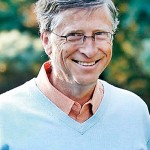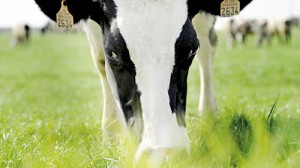Sunday Times 2
No need to go veggie
For many of those concerned about the future of the planet, giving up meat is seen as a major way for people to reduce the impact they have on the environment.
Producing beef, for example, requires large amounts of water, land for grazing and emits tonnes of greenhouse gases into the atmosphere.

Bill Gates, a failed vegetarian, says the world's demand for meat can be met with 'moderation and innovation' (Reuters)
But now Bill Gates, the billionaire founder of Microsoft and philanthropist, has said it may in fact be possible to keep eating meat and still care for the planet.
In a recent blogpost, the world’s richest man, has defended meat eating, saying it was unrealistic to expect large numbers of people to become vegetarian.
He also explains that some of the impacts of meat farming have been overstated.
Instead he believes it will be possible to provide enough meat for the world’s growing population as demand in developing countries increases.
He said: ‘Although it might be possible to get people in richer countries to eat less or shift toward less-intensive meats like chicken, I don’t think it’s realistic to expect large numbers of people to make drastic reductions.
‘Evolution turned us into omnivores.
‘But there are reasons to be optimistic. For one thing, the world’s appetite for meat may eventually level off.
‘Consumption has plateaued and even declined a bit in many rich countries, including France, Germany, and the United States.
‘I also believe that innovation will improve our ability to produce meat.’
The consumption of meat has met with considerable criticism in recent years as climate change experts have warned about the harm it is doing to the planet.

Cattle and other livestock produce more greenhouse gas emission globally than transport emissions (AFP)
Some researchers have also estimated that it takes several thousand litres of water to produce just one kilogram of beef due to the water needed to grow feed for them.
This makes livestock farming increasingly difficult in areas hit by drought.
Cattle grazing can also take valuable land that could be used to grow more affordable agricultural crops.
Demand for meat is expected to soar over the next 30 years or so, with global beef consumption rising from 64 million tonnes in 2005 to 106 million tonnes in 2050 according to the Food and Agricultural Organisation of the United Nations.
However, Mr Gates, who set up the Bill and Melinda Gates Foundation with his wife to fund research into sustainable technology that can tackle poverty around the world, said some of the impacts of meat have been overstated.
He points to research that suggests most of the water needed for livestock production is known as green-water, which is used to grow grass.
Most of this green water comes from rainfall and also evaporates back into the atmosphere, meaning it is not lost.
He said: ‘One study that excluded green water found that it takes just 44 litres – not thousands – to produce a kilo of beef.’
Mr Gates has also been funding new research projects aimed at producing meat substitutes and says he has been impressed with the results.
Companies have been experimenting with turning plant proteins into foods that taste and look like meat and eggs. Mr Gates also explains that he once dabbled with being vegetarian himself in his late twenties but found he couldn’t keep it going.
He argues that meat is an important source of nutrition needed to help children develop healthy and said it was important that people in developing countries have access to these foods.
He said: ‘With a little moderation and more innovation, I do believe the world can meet its need for meat.’
© Daily Mail, London

